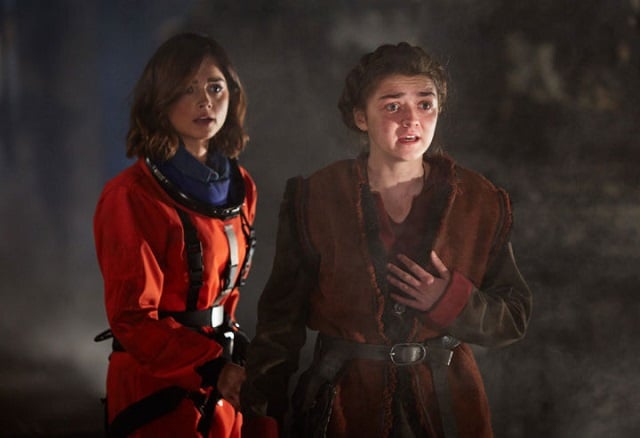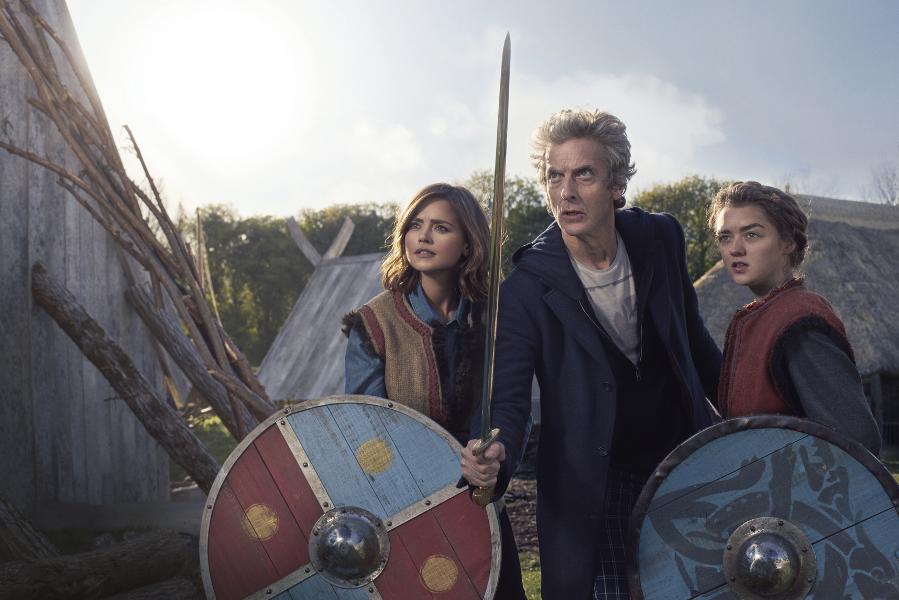Doctor Who, Series 9, Episode 5, “The Girl Who Died”
Written by Jamie Mathieson and Steven Moffat
Directed by Ed Bazalgette
Airs Saturdays at 9pm (ET) on BBC America
Doctor Who has had a solid run since Peter Capaldi stepped in as the Twelfth Doctor, with some creative ideas from the writers, a bigger emphasis on visual style from the directors, and strong performances from Capaldi and Jenna Coleman in the lead roles. However, for this Whovian (and as I discussed recently on Debating Doctor Who), no episode has fully come together, with each element of the show working at its peak to make a whole greater than its parts, as happens in the very best of each Doctor’s stories. With “The Girl Who Died”, that finally changes; the Twelfth Doctor at last has an indicative episode, a story that highlights the very best of this Doctor and the current version of the series.
Just about everything in this episode works, and works like gangbusters. We begin at the tail end of an unrelated adventure, a tense opening to what will become a much more relaxed episode: Clara is trapped alone in space with a deadly alien spider creeping up the inside of her spacesuit, intent on sucking her brain out through her mouth. It’s a terrifying concept well-executed by all involved. The opening shot, an upside-down close-up of Clara’s eye, disorients the audience and immediately puts the focus on Clara and her perilous predicament. We cut back and forth between Clara and The Doctor, but the close-ups of Clara’s face keep the audience very much with her, while the frantic camera cuts back and forth on the TARDIS to convey The Doctor’s concern, even if his voice doesn’t. It’s an exciting way to start the episode, throwing the audience into the deep end with Clara and The Doctor and showing their mettle, then their personalities as they recover. Clara’s first thought is of the people they were defending (I want to say the Felosians?) while The Doctor is relieved immediate danger has passed and is ready to chalk this up as good enough, even if their tally in the Win column comes with an asterisk. That central discussion—how much do they owe the people who request their help and just what does a win look like?—continues throughout the episode, tying this opening thematically with what’s to come and making it part of a larger, more cohesive whole.
When The Doctor and Clara land, the main adventure begins in earnest, with The Doctor exclaiming, “Oh, not Vikings! I’m not in the mood for Vikings”—sorry, Doctor, they can’t all be ghosts—as they are led away. Stripped of the sonic sunglasses and TARDIS, The Doctor and Clara must rely on their wits for the bulk of the story, and this forces the writers to spotlight their ingenuity and experience, rather than falling back on gadgets. Both Clara and The Doctor deliver, Clara going into protective teacher mode (her best mode) when she and Ashildr are endangered and The Doctor first giving the Vikings hard truths, then pulling out a win as only he can when they refuse to run. As was so effective in “Before the Flood”, the episode ends with a quiet, introspective moment between The Doctor and Clara, The Doctor reflecting on the nature of life as a functionally immortal being and hinting at what it appears more and more likely will be the climax of the season: The Doctor breaking the Laws of Time to save Clara, or heart-wrenchingly stopping himself from doing so. The Doctor and Clara’s close relationship is clear throughout the episode and at long last, they feel like the best friends and equals (or as close as The Doctor gets, with humans) The Doctor and his Companion should be.

*No, I’m not counting Mekhi Phifer in Torchwood: Miracle Day. Let’s just pretend none of that happened, and I didn’t review all of it week-to-week, shall we?
The rest of the villagers are entertaining as well, and the episode does a good job of balancing its cheesier, broader moments with real pathos. Ashildr’s father (Ian Conningham) gets a few nice scenes, but the standout among the villagers is the baby who inspires The Doctor’s plan. The writing for the baby, via The Doctor, is absolutely beautiful and Capaldi gives a tremendous performance, translating for the baby and conveying her fear while showing just how powerfully The Doctor is affected by her words. The Doctor speaking Baby was a fun comedic bit during the Eleventh Doctor’s tenure and Stormageddon—make that Alfie—is delightful, but here writers Jamie Mathieson and Steven Moffat take a fun, comparatively thrown off gag and mine it to incredible effect. It’s Capaldi’s stand-out sequence of the episode, which is saying something, because he’s also amazing with Coleman as The Doctor and Clara contemplate the day ahead and later, as they react to Ashildr’s death.
Now that The Doctor and Clara are true partners, now that they are treating each other with respect and no longer lying and keeping secrets, they can share moments like these, truthful and open exchanges that show how well they know each other and what they bring out in each other, for better and worse. The Doctor’s, “Oh, Clara Oswald. What have I made of you?” sends a chill down the spine, but it also carries warmth with the guilt and resignation. It appears the threads throughout the Twelfth Doctor’s tenure of Clara’s confidence and Doctor-ishness will finally be paid off this season.
 These scenes succeed for much more than the excellent performances of Capaldi and Coleman, however. In the earlier conversation, the moody lighting and brewing storm adds atmosphere, The Doctor shrouded in gloom while Clara sits in a beam of light, and later, the score drops out entirely for The Doctor’s frustrated rant, a cadenza for Capaldi that he makes the most of; any underscoring would distract and detract here, and the composer wisely acknowledges this. It’s not any episode that could quote “Fires of Pompeii” and not pale in comparison—just seeing a snippet of Catherine Tate’s performance from the scene shown is a gut-punch. While “The Girl Who Died” may not match “Fires of Pompeii”, it benefits from this connection, the Doctor realizing the in-show reason he looks like Capaldi and learning the lesson Donna Noble taught him back then, and that Clara spends the beginning of the episode steering him towards. While the decision The Doctor makes here may head him down a path towards a heartbreaking end of the season, it’s driven by and in keeping with character, both his past and his present, which is why it’s so meaningful and powerful.
These scenes succeed for much more than the excellent performances of Capaldi and Coleman, however. In the earlier conversation, the moody lighting and brewing storm adds atmosphere, The Doctor shrouded in gloom while Clara sits in a beam of light, and later, the score drops out entirely for The Doctor’s frustrated rant, a cadenza for Capaldi that he makes the most of; any underscoring would distract and detract here, and the composer wisely acknowledges this. It’s not any episode that could quote “Fires of Pompeii” and not pale in comparison—just seeing a snippet of Catherine Tate’s performance from the scene shown is a gut-punch. While “The Girl Who Died” may not match “Fires of Pompeii”, it benefits from this connection, the Doctor realizing the in-show reason he looks like Capaldi and learning the lesson Donna Noble taught him back then, and that Clara spends the beginning of the episode steering him towards. While the decision The Doctor makes here may head him down a path towards a heartbreaking end of the season, it’s driven by and in keeping with character, both his past and his present, which is why it’s so meaningful and powerful.
That’s the single aspect this episode gets so right that has been lacking elsewhere in the Twelfth Doctor’s tenure. There’s style, there’s fun—the design for FakeOdin is great, as is The Doctor’s dorky yo-yo routine—there are genre elements, there are ideas and moments that could only come up on Doctor Who, but grounding all of this is a dedication to character, to both The Doctor and Clara. That balance is incredibly tricky to land, and even very good episodes of Doctor Who don’t quite hit the mark. But the great episodes, the most memorable and lasting ones, find a way to bring all of these disparate elements together and make them sing. “The Girl Who Died” is one such episode, a fantastic outing for a series that over the past few seasons has, like The Doctor, too frequently settled for good enough and now hopefully, has its sights set higher.

